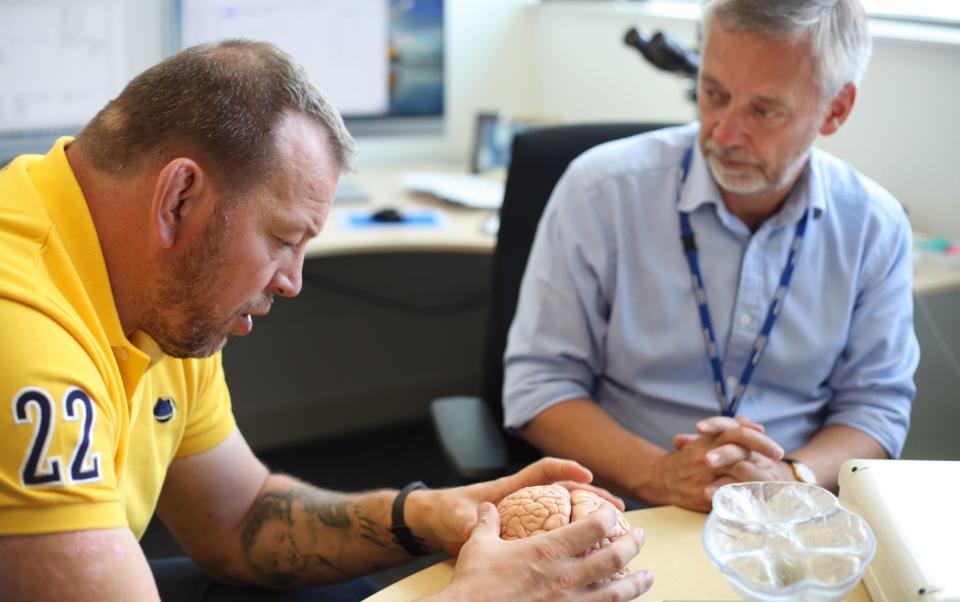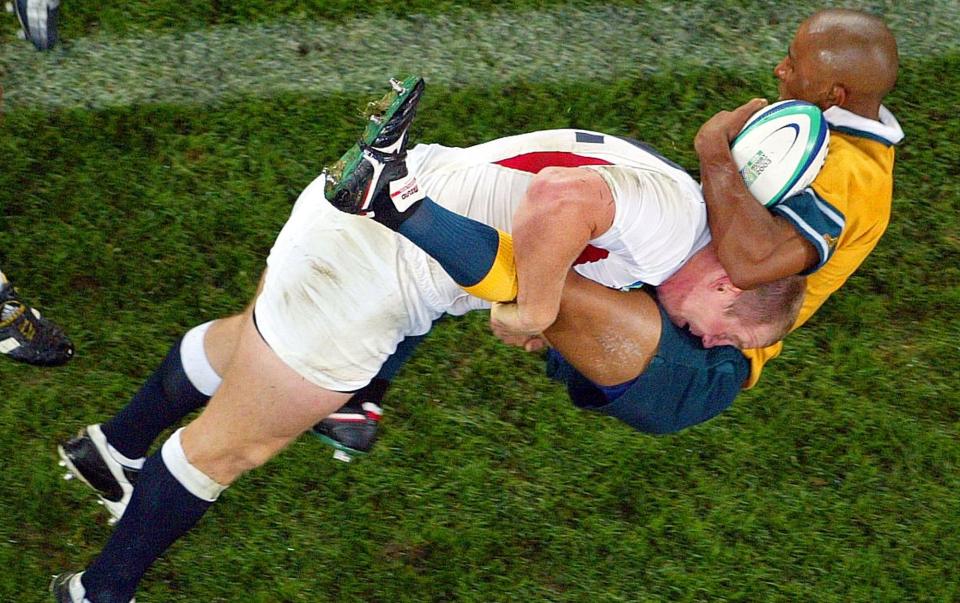Former England rugby captain Mike Tindall has been shown a red card for inadvertent play and said rugby must embrace the physical side of the game.
The Rugby World Cup-winning center questioned why cards were dealt when there was clearly no malice at any stage of the game.
Tindall, 45, who won 75 caps for England, said he believed the game needed to change for the better.
“The game is in a very difficult place,” Tindall told Telegraph Sport. “It’s a game that is played by educated people and watched by educated people, but at the same time the game has to figure out what it is and from my point of view, after playing it for twenty years, and I’m still watching it now, It’s actually a physical game and we just have to embrace that.
“They will be hard blows, that’s what. That’s why we play Test matches, it’s a test of your body, your mind, your soul and that’s what people like to see.
“I think we have to embrace what we are.”
He added: “We need to make training less physical and more skills based. I think it’s changing, though, and teams have taken it upon themselves to do it. I don’t think we can make the game less physical, because now you’re talking about getting red cards for tiny things that no one can actually make a difference to at that moment. They just can’t do that. It’s a reaction thing.
“We never want teams to end up with 14 men and if you look at what that has done to social media, how the game is talked about and how referees are treated when they are in a position where they have followed the letter the law and it will be a red card.
“Unfortunately everything in rugby, every law is open to its own interpretation and opinion, and everyone has a different opinion, so I think from that perspective it really opens the game up to self-criticism and social media comes into play. hatred that we have seen so much with referees leaving the match, players taking a break from internationals because they had had enough.


“That’s not what we want. So we cannot say that we are doing it right, it is not right. I feel like other sports like rugby league are reporting incidents.
“The other day someone tripped during the Champions Cup, got kicked in the face by his own friend and tripped on someone’s head and got a red card.
“Something that was completely coincidental and out of his control, he gets kicked in the throat by his own teammate and unfortunately his stallion accidentally landed on someone else’s head and he gets a red card for it.
“There is no malice in that. Why do we get red cards for things that are complete accidents and there is no malice?
“You don’t judge a red card on what the consequences are of what happened, like the other man cut his head off so it has to be a red card, or the other man is injured so it has to be a red card.
“It doesn’t work that way, but in the event of a rugby incident that is purely accidental bad luck, matches are lost. It costs games, we are talking about a game that costs money and if you reduce it all the way down to fourteen men, it just turns the game in someone else’s favor.”
‘Don’t change the game from what makes it attractive’
Tindall questioned the motives behind the concussion case, which has seen almost 300 former players take legal action against the Rugby Football Union, Welsh Rugby Union and World Rugby over what those involved want to achieve. The 2003 World Cup winner also proposed a global charity fund as a better mechanism to help struggling ex-professionals, so that money is not taken out of the game but to be used to help those who are in it.
“Within that, we have to get the guys playing the best they can, but I don’t think that means we have to change the game from what makes it attractive. I think if you mess with the game too much… I think now we have to look all the time at what’s happening off the pitch rather than on it,” Tindall explained.
“The work that goes into it and the research, obviously the gum shields, the technology and the hits – you have brain scans for players to make sure they know where they are and brain tracking to make sure you know what their brain is appearance and aftercare to make sure we take care of the players after the match.
“If they have given their life and soul to the game, we have to take care of them because they are not going to make a lot of money.”
Tindall, who played for both Bath and Gloucester during his career, has not suffered in the same way as his former England hookers teammates Steve Thompson, who has been diagnosed with early-onset dementia, and tight end prop Phil Vickery.
They are among a group of at least 295 former players who have launched a concussion lawsuit and are suing the game’s governing body for damages.


“I love this game, I think it creates great characters and my concern with the lawsuit is what is the end game, what is it for and is this the best way to do it?” he said.
“You talk to people about what isn’t there at the moment and it’s a fund and a facility that takes care of players playing the game. Whereas now they look at certain clubs and now have benevolent funds for old players. So people are starting to realize that clubs and unions are responsible for the support given to those who play the game.
“When you put on the white jersey of England or the jersey of Wales you are giving yourself to something bigger on the pitch and things can go wrong on that pitch – so you need to be looked after.
“I don’t think the people at the top of the game think about that unfortunately. I think the players are still seen as a commodity.”
‘We need a global benevolent fund’
Tindall, who runs a charity ski challenge in Saalbach, Austria, called Mikey’s Mountain Miles, sponsored by Skiset, said he feared the financial impact on the game.
“We don’t make enough money to take care of ourselves medically – some people do, but some people don’t. “I think the game allows players to have something that can help players shape their careers,” he said.
“That’s what’s missing, but if we go down this route of suing, God knows how much it will cost – you’re just taking money out of the game that could be put into that solution.
“And what better way to do that than – that means World Rugby, or the RFU or the WRU, opening up and saying, ‘Okay, we’re wrong,’ which I don’t think they’ll say, but we We need to look and start building this global benevolent fund, with who played the game to build that.
“We don’t have it now, but we need to start the process, it would be useful.”
Tindall is the patron of the Matt Hampson Foundation, which supports the treatment of young people seriously injured through sport – one of the charities that will benefit from the ski challenge running from March 5 to 9 – and he also supports Wings for Life, which helps find a cure for spinal cord injuries.
“I think there are lifestyle choices.”
Tindall admitted that given the nature of the physical way he played the game, he would have thought his health would also have been affected, but he highlighted that there were a number of factors affecting retired players.
“There is so much more to early dementia than just having played the game and suffered setbacks,” he said.
“If you look at my career, I would probably have the first for that.
“I was a physical player. I made God knows how many tackles, that was my kind of role as a defensive leader and everything else. I brought that physicality. I was one of the first bigger kind of centers, a crashball type center, the running center, whatever you want.
“I would probably be much more in that category. I think attackers are more likely to be there just because of the nature of it, because they have more contact and more collisions.”


He added: “I think there are lifestyle choices. There is no doubt about how cleanly you live, there are hereditary matters. There’s so much more to it, I think, than just what happens on the field and what happens in the training paddock.
“We look at it too much, because we think that a lower approach will suddenly change everything.
“Even when you tackle around the chest, around the waist, you still have the first contact with those tackles and your head is thrown back and forth, flat on the ground, the brain shaking. You’ll still… I don’t feel like it’s going to be a revolution. I think we’ve gotten rid of all the malice where we don’t have shoulder problems, we don’t have elbows leading – we don’t have those things that had to go out of the game.
“We’ve eradicated all that evil and those terrible things and now you’re talking about margins that you can’t process fast enough to change outcomes.
“So that’s why you just have to embrace what we are in the game, which everyone loves, that physical aspect, and everyone loved that match between Ireland and South Africa in the World Cup, because everyone left everything on the pitch, and that’s what I want to see you as a fan.”
Anyone looking to sign up for their ski challenge can visit https://mikeysmm.com/home_page